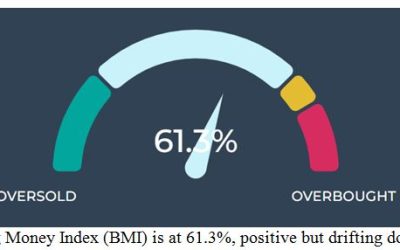by Louis Navellier
September 3, 2025
Last Tuesday, The Wall Street Journal published an article entitled, “There Is Now Clear Evidence AI Is Wrecking Young America’s Job Prospects.” The article cited a paper by three Stanford economists that concluded: “There’s a clear, evident change when you specifically look at young workers who are highly exposed to AI.” The article says Stanford has a high proportion of computer science graduates, but they are increasingly struggling to find work in the wake of big technology companies implementing AI and increasing layoffs. The Stanford paper pointed out that, “After late 2022 and early 2023, you start seeing that their employment [in computer science] has really gone in a different direction than other workers.”
It seems somewhat ironic that AI is reducing the demand for computer science majors, but I would say that Palantir Technologies is probably implementing AI better than most companies as it strives to revamp the U.S. Defense Department, the CIA, NSA and other federal agencies. Palantir stock has been attracting the attention of short sellers, but I suspect it will “squeeze the shorts” when it announces its next quarterly results. The analyst community is expecting Palantir to post 50.5% sales growth of $1.09 billion and 68.2% earnings growth of 17 cents per share. In the past month, the analyst community has revised their consensus earnings estimate 21.4% higher. Positive analysts’ earnings revisions tend to precede future earnings surprises, so I am optimistic that Palantir can resurge in the coming months.
Overall, we are now in a brave new world where our standard of living is increasingly dependent on AI enhancing productivity to boost GDP growth. In the next several years, AI will continue to invade our lives. We’re likely to see home assistant robots in a decade or two, but the adoption rate for robots will likely be slow at first. Right now, robots are dominating warehousing as well as the factory floor to help boost productivity. These productivity gains help to reduce inflationary pressures as the dollar revives.
In the wake of Fed Chairman Jerome Powell’s Jackson Hole talk, the Fed is expected to cut key interest rates at its September Federal Open Market Committee (FOMC) meeting and continue cutting for the rest of this year. After a strong earnings season, this rate cut should be able to deliver a “one-two” punch that should further boost stock prices. Several interest rate cuts are desperately needed in order to stimulate the housing industry, which is struggling with falling home prices. In the past 12 months, median home prices have risen only 0.2% to $422,400 through July 31, so at least housing inflation is cooling off.
The primary inflation catalyst has been higher shelter costs, based on owners’ equivalent rent, which has been cooling off in recent months. As soon as owners’ equivalent rent is unchanged or actually declines, then inflationary pressures are expected fall below the Fed’s long-awaited 2.0% inflation target.
A greater risk (than inflation) is deflation and declining populations. At the Kansas City Fed Conference in Jackson Hole, the central bank heads of Britain, the European Union (EU) and Japan said the world’s largest economies will increasingly lack the workers they need to power economic growth due to aging populations. AI and productivity growth can counteract part of the poor demographics that now plague most of the world, and European Central Bank (ECB) President Christine Lagarde said an influx of foreign workers would play a “crucial role” in counter-acting negative demographic trends.
Some U.S. Economic Statistics May Seem Negative –
But Many of Them Contain Positive “Green Shoots”
Last Tuesday, the Labor Department announced that durable goods orders plunged 2.8% in July, which was substantially better than the economists’ consensus forecast of a 3.8% decline. Transportation orders declined 9.7%, due to a 32.7% drop in commercial aircraft orders, but excluding transportation, durable goods orders actually rose by 1.1%. Economists were expecting only a 0.2% increase in durable goods orders, excluding transportation, so this was a big “green shoot” in the durable goods report!
Also on Tuesday, the Conference Board announced its consumer confidence index declined by 97.4 in August, down from 98.7 in July. The present situation component declined to 131.2 in August, down from 132.6 in July, while the August expectations component declined to 74.8, down from 76 in July.
According to the Conference Board, when the expectations component is below 80, it typically signals a recession. Clearly, there is some consumer anxiety, making it imperative that the Fed cut key interest rates and keeps cutting in the upcoming months to bolster consumer sentiment and avoid a recession.
I should add that German consumers are also moody. Last Wednesday, a sentiment index published by research groups GfK and the Nuremberg Institute for Market Decisions deteriorated for the third month in a row, falling to -23.6, down 1.9-points from the previous month. There are growing fears of job losses in Germany as its manufacturing sector struggles to cope with higher electricity prices. Germany remains in a recession that has persisted for over two years – and there is no sign of an economic recovery.
On Friday, the U.S. Commerce Department reported the Personal Consumption Expenditure (PCE) inflation index rose 0.2% in July and 2.6% in the past 12 months. The core PCE, excluding food and energy, rose 0.3% and 2.9% in the past 12 months. Both the PCE and core PCE were in line with the economists’ consensus expectation. The PCE is the Fed’s favorite inflation indicator, and the latest numbers remain on track with the Fed’s target range for a key interest rate cut on September 17th.
I was on Fox Business during the PCE announcement, and I discussed how labor market concerns are now the Fed’s top priority. The August payroll report on September 5th could influence the FOMC, but since Fed Governor Christopher Waller has been talking about multiple rate cuts, or even a larger rate cut in September if there is a poor payroll report, a key interest rate cut on September 17th remains on track.
Here is a link to my Fox Business appearance, where I cover the PCE data and the latest Nvidia news.
I also expect a resurgence in the U.S. dollar due to: (1) stronger GDP growth, (2) the fact that the Fed is the last major central bank to cut key interest rates, and (3) the U.S. has superior demographics. A resurging U.S. dollar would be deflationary and should help to offset any price increases due to tariffs.
And finally, as we enter September, we know that global crude oil demand tends to decline after Labor Day, as seasonal demand wanes. However, Russian crude oil exports have fallen by 600,000-barrels per day in the past two weeks due to Ukraine attacking pipelines, refineries and a major pumping station.
Specifically, the Unecha pump station, which is close to Russia’s border with Belarus, was attacked by Ukrainian drones twice in the past couple of weeks. President Trump’s increase of U.S. import tariffs on goods from India to 50%, due to purchases of Russian oil, is also a factor. Crude oil shipments heading to India have fallen by more than 500,000 barrels a day over the past two months. As a result of these crude oil market disruptions, crude oil prices may not fall as dramatically this autumn, even if demand declines.
Navellier & Associates; own Nvidia Corp (NVDA), and Palantir Technologies Inc. Class A (PLTR), in managed accounts. Louis Navellier and his family owns Nvidia Corp (NVDA), and Palantir Technologies Inc. Class A (PLTR), via a Navellier managed account and Nvidia Corp (NVDA), in a personal account.
The post 9-3-25: The Growing Impact of AI on Business – and Work appeared first on Navellier.





